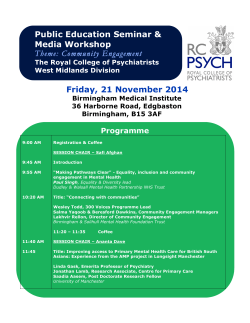
TEWV FT Master PowerPoint - Yorkshire and the Humber Deanery
Developing psychiatrists as clinical leaders Dr Lenny Cornwall Deputy Medical Director, TEWV NHSFT Summary What is a clinical leader? My personal development Leadership programme for SRs in TEWV Leadership competencies for consultants Leading the clinical team What is a clinical leader? What does the GMC say? Leadership (all doctors) Most doctors work in multidisciplinary teams. The work of these teams is primarily focused on the needs and safety of patients. The formal leader of the team is accountable for the performance of the team, but the responsibility for identifying problems, solving them and taking the appropriate action is shared by the team as a whole. You must be willing to work with other people and teams to maintain and improve performance and change systems where this is necessary for the benefit of patients. You should respect the leadership and management roles of other team members, including non-medical colleagues. What is a clinical leader? What does the RCPsych say? OP74 The role of the consultant psychiatrist (2010) a consultant psychiatrist can, and indeed is uniquely positioned to, lead a team in such a way that practice and outcomes for patients are good and are continuously improving the seniority of the consultant within the multi-disciplinary team can confer accountability for clinical leadership, but it is not automatic Why is this so difficult? The meaning behind medical language Making doctors Simon Sinclair (1951-2014) “The psychiatrist is thus the lowest form of medical life, but is joined in the first circle of medical student hell by psychologists, sociologists, and general practitioners. In Sinclair’s jargon, they lack proper Knowledge (“hard facts”), do not give proper Experience (finding physical signs or learning practical procedures), and do not have proper Responsibility (going on as they do about multidisciplinary teams).” Book review by Simon Wessely (1998) What is valued in medical culture? High value Low value Knowing stuff Finding things out Certainty Uncertainty Clinical experience Academic practice Individual responsibility Team working Competition Co-operation Practice Theory Think like a patient, act like a tax payer My personal history Higher training chair of RCPsych PTC during Calmanisation Early years as consultant Leading a adult psychiatry sector team different Trust, different culture DME leadership training for SRs DMD competency framework for consultant recruitment Medical leadership competency framework Healthcare leadership model Effective leadership of clinical teams Leading to quality report (Yorkshire MH trusts, 2013) Characteristics of leaders of effective teams Passionate about providing quality service Democratic but decisive leadership Focused on team as a unit and individuals within it Willing to manage performance Able to balance needs of team and of the organisation Vary approaches to manage change Alimo-Metcalfe et al (Bradford University, 2013) Healthcare leadership model Inspiring a shared purpose Leading with care Evaluating information Connecting our service Sharing the vision Engaging the team Holding to account Developing capability Influencing for results What should happen? What the MLCF says Undergraduate Demonstrating personal qualities, Working with others Postgraduate Managing services, Improving services Continuing practice Setting direction What can happen? A realistic approach to training: registrars Demonstrating personal qualities Self awareness & reflection Plan own workload Audit own practice Working with others Being part of the team (for 6 months) Valuing the contribution of other professionals Giving feedback to others What can happen? A realistic approach to training: senior registrars Managing services Attend service management meetings Manage resources you control Highlight waste Supervise more junior staff Improving services Participate in clinical governance process Undertake complex audits Lead a change project OP80 (RCPsych, 2012) Translating the MLCF competency framework to the psychiatry curriculum Organising clinics Carrying out supervision Prioritising work Dealing with concerns Delegating to the team Leading change Leadership training for SRs TEWV leadership training programme 6 x full day workshops over 12 months Doctors as leaders The NHS Managing change and service improvement NHS financing and commissioning Personal effectiveness Emotional intelligence and team working Leading a change project with a “leadership champion” (voluntary component) Leadership competency for consultants TEWV recruitment model 4 competency domains Clinical knowledge, skills and experience Academic skills & life long learning Personal & professional qualities Leadership Leadership Self awareness & openness to change Influencing & persuading Commitment to quality Organisational commitment Job descriptions & job planning Clinical duties of post Educational & academic duties General professional duties Leadership duties Provide leadership to MDT alongside team manager Contribute to service development Contribute to clinical governance & responsibility for setting and maintaining standards Show commitment to quality improvement Leading a clinical team Psychiatrists as leaders of the clinical team Self awareness Seek & act on feedback Influencing & persuading Use power & influence appropriately Work within organisational constraints Commitment to quality Learn from mistakes Work with team manager to develop service Organisational commitment Understand & accept Trust priorities A new example to consider Bridging the clinical leadership gap AoMRC guide to effective use of resources in everyday clinical practice Written by 2 SRs Published this week Promoting value How reducing waste leads to higher value care 20% of clinical practice brings no benefit to the patient (Berwick, JAMA, 2012) A cultural shift is required which calls upon doctors and other clinicians to ask, not if a treatment or procedure is possible, but whether it provides real value to the patient and genuinely improves the quality of their life 3 key areas Overuse of medication Overuse of diagnostic or monitoring tests Unplanned admissions Conclusions Psychiatrists should be and must be clinical leaders Medical training means leadership development does NOT happen automatically Competency based curriculum may have made the situation worse rather than better (discuss!) Disconnect between clinical and leadership curricula Leadership skills are the key to consultant appointment (in TEWV at least)
© Copyright 2025













